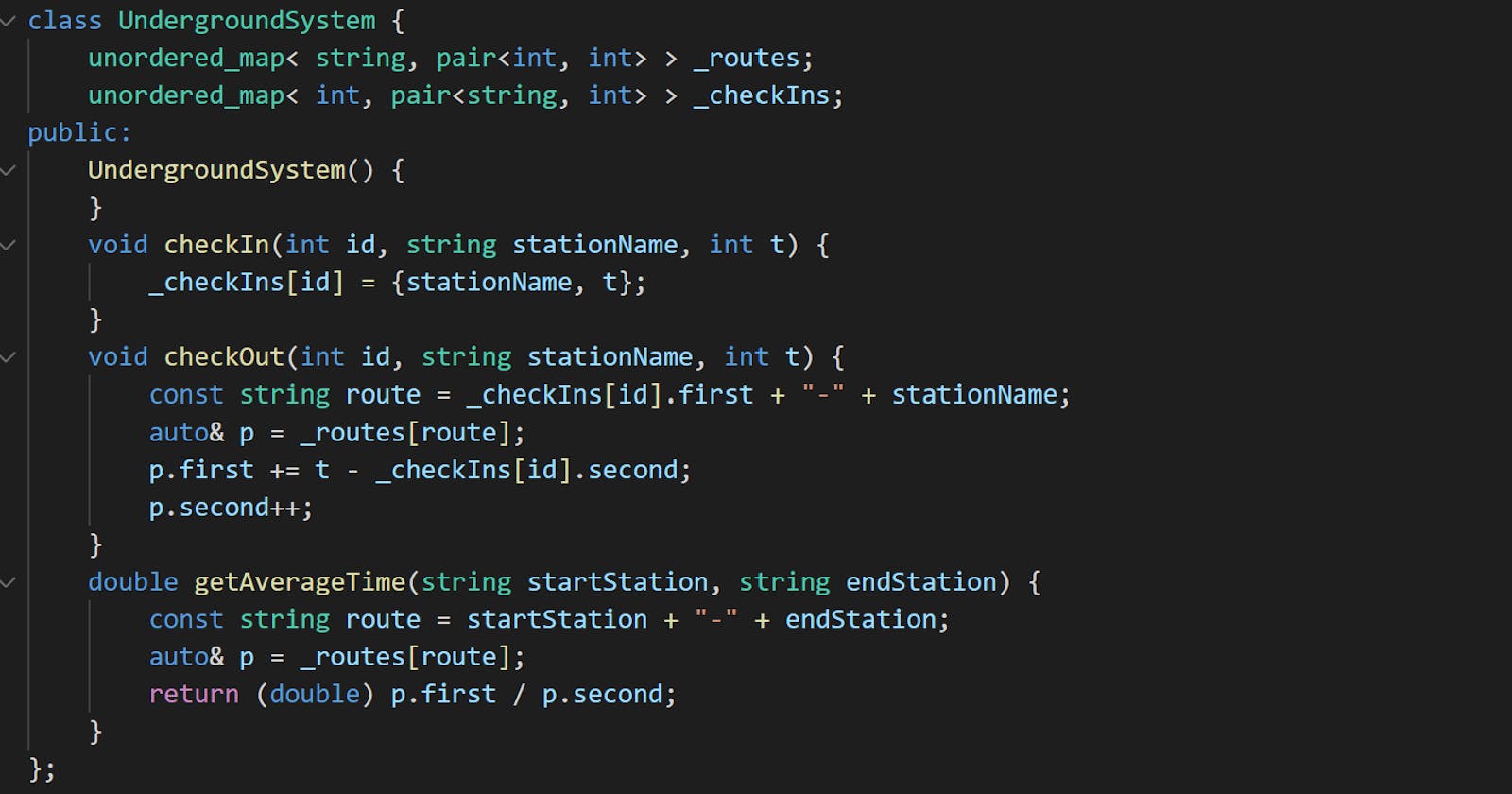Problem statement
An underground railway system is keeping track of customer travel times between different stations. They are using this data to calculate the average time it takes to travel from one station to another.
Implement the UndergroundSystem class:
void checkIn(int id, string stationName, int t)- A customer with a card ID equal to
id, checks in at the stationstationNameat timet. - A customer can only be checked into one place at a time.
- A customer with a card ID equal to
void checkOut(int id, string stationName, int t)- A customer with a card ID equal to
id, checks out from the stationstationNameat timet.
- A customer with a card ID equal to
double getAverageTime(string startStation, string endStation)- Returns the average time it takes to travel from
startStationtoendStation. - The average time is computed from all the previous traveling times from
startStationtoendStationthat happened directly, meaning a check-in atstartStationfollowed by a check-out fromendStation. - The time it takes to travel from
startStationtoendStationmay be different from the time it takes to travel fromendStationtostartStation. - There will be at least one customer that has traveled from
startStationtoendStationbeforegetAverageTimeis called.
- Returns the average time it takes to travel from
You may assume all calls to the checkIn and checkOut methods are consistent. If a customer checks in at time t1 then checks out at time t2, then t1 < t2. All events happen in chronological order.
Example 1
Input
["UndergroundSystem","checkIn","checkIn","checkIn","checkOut","checkOut","checkOut","getAverageTime","getAverageTime","checkIn","getAverageTime","checkOut","getAverageTime"]
[[],[45,"Leyton",3],[32,"Paradise",8],[27,"Leyton",10],[45,"Waterloo",15],[27,"Waterloo",20],[32,"Cambridge",22],["Paradise","Cambridge"],["Leyton","Waterloo"],[10,"Leyton",24],["Leyton","Waterloo"],[10,"Waterloo",38],["Leyton","Waterloo"]]
Output
[null,null,null,null,null,null,null,14.00000,11.00000,null,11.00000,null,12.00000]
Explanation
UndergroundSystem undergroundSystem = new UndergroundSystem();
undergroundSystem.checkIn(45, "Leyton", 3);
undergroundSystem.checkIn(32, "Paradise", 8);
undergroundSystem.checkIn(27, "Leyton", 10);
undergroundSystem.checkOut(45, "Waterloo", 15); // Customer 45 "Leyton" -> "Waterloo" in 15-3 = 12
undergroundSystem.checkOut(27, "Waterloo", 20); // Customer 27 "Leyton" -> "Waterloo" in 20-10 = 10
undergroundSystem.checkOut(32, "Cambridge", 22); // Customer 32 "Paradise" -> "Cambridge" in 22-8 = 14
undergroundSystem.getAverageTime("Paradise", "Cambridge"); // return 14.00000. One trip "Paradise" -> "Cambridge", (14) / 1 = 14
undergroundSystem.getAverageTime("Leyton", "Waterloo"); // return 11.00000. Two trips "Leyton" -> "Waterloo", (10 + 12) / 2 = 11
undergroundSystem.checkIn(10, "Leyton", 24);
undergroundSystem.getAverageTime("Leyton", "Waterloo"); // return 11.00000
undergroundSystem.checkOut(10, "Waterloo", 38); // Customer 10 "Leyton" -> "Waterloo" in 38-24 = 14
undergroundSystem.getAverageTime("Leyton", "Waterloo"); // return 12.00000. Three trips "Leyton" -> "Waterloo", (10 + 12 + 14) / 3 = 12
Example 2
Input
["UndergroundSystem","checkIn","checkOut","getAverageTime","checkIn","checkOut","getAverageTime","checkIn","checkOut","getAverageTime"]
[[],[10,"Leyton",3],[10,"Paradise",8],["Leyton","Paradise"],[5,"Leyton",10],[5,"Paradise",16],["Leyton","Paradise"],[2,"Leyton",21],[2,"Paradise",30],["Leyton","Paradise"]]
Output
[null,null,null,5.00000,null,null,5.50000,null,null,6.66667]
Explanation
UndergroundSystem undergroundSystem = new UndergroundSystem();
undergroundSystem.checkIn(10, "Leyton", 3);
undergroundSystem.checkOut(10, "Paradise", 8); // Customer 10 "Leyton" -> "Paradise" in 8-3 = 5
undergroundSystem.getAverageTime("Leyton", "Paradise"); // return 5.00000, (5) / 1 = 5
undergroundSystem.checkIn(5, "Leyton", 10);
undergroundSystem.checkOut(5, "Paradise", 16); // Customer 5 "Leyton" -> "Paradise" in 16-10 = 6
undergroundSystem.getAverageTime("Leyton", "Paradise"); // return 5.50000, (5 + 6) / 2 = 5.5
undergroundSystem.checkIn(2, "Leyton", 21);
undergroundSystem.checkOut(2, "Paradise", 30); // Customer 2 "Leyton" -> "Paradise" in 30-21 = 9
undergroundSystem.getAverageTime("Leyton", "Paradise"); // return 6.66667, (5 + 6 + 9) / 3 = 6.66667
Constraints
1 <= id, t <= 10^6.1 <= stationName.length, startStation.length, endStation.length <= 10.- All strings consist of uppercase and lowercase English letters and digits.
- There will be at most
2 * 10^4calls in total tocheckIn,checkOut, andgetAverageTime. - Answers within
1e-5of the actual value will be accepted.
Solution 1: Store all travel times between the stations
Code
#include <iostream>
#include <unordered_map>
#include <numeric>
#include <vector>
using namespace std;
class UndergroundSystem {
unordered_map< string, vector<int> > _routes;
unordered_map< int, pair<string, int> > _checkIns;
public:
UndergroundSystem() {
}
void checkIn(int id, string stationName, int t) {
_checkIns[id] = make_pair(stationName, t);
}
void checkOut(int id, string stationName, int t) {
const string route = _checkIns[id].first + "-" + stationName;
_routes[route].push_back(t - _checkIns[id].second);
}
double getAverageTime(string startStation, string endStation) {
const string route = startStation + "-" + endStation;
vector<int>& v = _routes[route];
return (double) accumulate(v.begin(), v.end(), 0) / v.size();
}
};
int main() {
UndergroundSystem u;
u.checkIn(45, "Leyton", 3);
u.checkIn(32, "Paradise", 8);
u.checkIn(27, "Leyton", 10);
u.checkOut(45, "Waterloo", 15);
u.checkOut(27, "Waterloo", 20);
u.checkOut(32, "Cambridge", 22);
cout << u.getAverageTime("Paradise", "Cambridge") << endl;
cout << u.getAverageTime("Leyton", "Waterloo") << endl;
u.checkIn(10, "Leyton", 24);
cout << u.getAverageTime("Leyton", "Waterloo") << endl;
u.checkOut(10, "Waterloo", 38);
cout << u.getAverageTime("Leyton", "Waterloo") << endl;
}
Output:
14
11
11
12
Complexity
- Runtime:
O(1). - Extra space:
O(2*N + 2^M * P), whereNis the number of customers,Mis the number of stations andPis the average number of travels between the stations.
Solution 2: Store only the total travel time
Code
#include <iostream>
#include <unordered_map>
using namespace std;
class UndergroundSystem {
unordered_map< string, pair<int, int> > _routes;
unordered_map< int, pair<string, int> > _checkIns;
public:
UndergroundSystem() {
}
void checkIn(int id, string stationName, int t) {
_checkIns[id] = {stationName, t};
}
void checkOut(int id, string stationName, int t) {
const string route = _checkIns[id].first + "-" + stationName;
auto& p = _routes[route];
p.first += t - _checkIns[id].second;
p.second++;
}
double getAverageTime(string startStation, string endStation) {
const string route = startStation + "-" + endStation;
auto& p = _routes[route];
return (double) p.first / p.second;
}
};
int main() {
UndergroundSystem u;
u.checkIn(45, "Leyton", 3);
u.checkIn(32, "Paradise", 8);
u.checkIn(27, "Leyton", 10);
u.checkOut(45, "Waterloo", 15);
u.checkOut(27, "Waterloo", 20);
u.checkOut(32, "Cambridge", 22);
cout << u.getAverageTime("Paradise", "Cambridge") << endl;
cout << u.getAverageTime("Leyton", "Waterloo") << endl;
u.checkIn(10, "Leyton", 24);
cout << u.getAverageTime("Leyton", "Waterloo") << endl;
u.checkOut(10, "Waterloo", 38);
cout << u.getAverageTime("Leyton", "Waterloo") << endl;
}
Output:
14
11
11
12
Complexity
- Runtime:
O(1). - Extra space:
O(2*N + 2^M * P), whereNis the number of customers,Mis the number of stations andPis the average number of travels between the stations.
